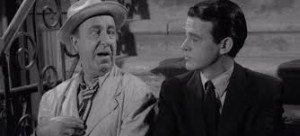I think it’s fair to say that most everyone, when their number comes up, would happily cheat death. The question is, how eager would you be to swap places with someone to spare them from the glacial clutches of the Grim Reaper?
For Lou Bookman, the answer to that conundrum was a no-brainer. A pitchman whose carry-case contains wind-up toys and neck ties, lotions and topical creams, his spiel may be growing wearisome to passersby on the busy city streets but Lou nonetheless has won a special place in the hearts of the neighborhood children who eagerly await his arrival every afternoon. One visitor to his home on a hot July at 3 p.m. who agrees, in a most official capacity, that Lou has worn out his welcome is none other than Death.
Played by Murray Hamilton (best known as Mayor Vaughn in “Jaws”), Death informs Lou that his departure is due to take place in his sleep, peacefully and conveniently, at midnight. He suggests that Lou take the remaining time to get his affairs in order and that he is lucky to have been forewarned unlike the tragic victims who are afforded no such opportunity. Lou’s retort is to chastise the man sitting and chatting so casually in his apartment of being devious and dishonest, so to prove that he is who he indeed claims to be, Death simply touches the tip of his forefinger to the head of a rose planted in a pot on the windowsill. It wilts instantly.
Little Maggie enters Lou’s room to have him repair the mechanical robot that he had given her earlier. As he adjusts the key which allows the toy to chatter and clamber forward, Lou admonishes her for her lack of manners, as she had not acknowledged the gentleman in the corner. “What gentleman?” Maggie asks. Death, of course, can only be seen by those intended to accompany him. She playfully bids farewell to Lou’s invisible friend and scampers back onto the sidewalk below.
There are three extenuating circumstances for appeal, Death explains. Hardships, but Lou has no family to provide for. Priority cases, but Mr. Bookman is not a scientist or surgeon whose continued presence will make any substantial difference to the world at large. Last but not least are those with unfinished business of a major nature. Here Lou, ever the crafty salesman, finds a loophole and convinces Death that-even nearing 70 years of age-he has yet to make that one big pitch of a lifetime, one to make the children proud. “One for the angels,” he submits.
The intruder relents but, insistent upon a deadline (so to speak), soon finds himself on the opposite side of a locked door, as Lou has no immediate plans to make good on the inception of his grand design. Death cannot be negotiated with, however, and confesses to a fleeing Lou that “I’ve been forced to seek an alternative”, whereupon they hear screams and the screech of brakes and run outside to find Maggie lying lifeless in front of an automobile, the driver of which swears that she ran out of nowhere and he had no time to stop.
As Lou takes her hand with Death hovering over his shoulder, Maggie’s eyes flicker open just as a shadow passes across her face and she inquires, “Lou, who’s that man?”, the horrible truth slamming home.
Death, waiting for his midnight appointment with Maggie, wonders why Lou is setting up a pitch so late in the evening with the streets virtually devoid of potential marks. Except for one, that is. Albeit a tough customer the likes of which Lou has never dealt with. In no immediate need for a new tie, Death seems more intrigued by the story of a special thread smuggled into the country by birds specially trained for long-distance ocean travel in small satchels beneath their ruby throats. 832 crossings are required to supply thread enough for one spool which normally sells for $30 or more. Today only, one can be had for 25 cents. Fully entranced by the extravagant salesmanship, Death greedily takes all Lou has. Sewing needles, yarn, cures for athlete’s foot and eczema, simulated cashmere socks-Death stuffs all of these and more into a shopping bag as the clock strikes midnight, causing him to miss his possession of the innocent child’s soul.
Maggie stirs contentedly in her sleep, a slight smile playing upon her lips as her robot takes an unaided stroll across her night-stand and past the clock which reads 12:01. Lou pulled a fast one on the Grim Reaper’s messenger, but he is well aware that Death cannot return from whence he came empty-handed. Lou doubles back to retrieve his case of goods, telling a quizzical Death that “You never know who might need something up there.”
“Up there?” Lou repeats hopefully, finger extended heavenward.
“Up there, Mr. Bookman,” Death assures him. “You made it.”
Lou travels into the night with his new companion as Rod Serling describes him as “formerly a fixture of the summer, formerly a rather minor component to a hot July but, throughout his life, beloved by the children and, therefore, a most important man.”
Lou Bookman was portrayed by stage and screen veteran Ed Wynn whose show business origins trace back to the vaudevillian era as a member of the Ziegfeld Follies. As legend has it, Wynn was once knocked unconscious during a performance by W.C. Fields who, brandishing a pool cue being used in their scene, felt that he was being upstaged. Interestingly, Wynn would appear as another character seeking to delay his mortal demise in the Twilight Zone episode “Ninety Years Without Slumbering” from the show’s fifth and final original season. Sam Forstmann, unable to overcome the notion that his survival is dependent upon the functioning of his grandfather clock-that its continued ticking somehow mimics the beating of his very heart-obsesses to the point of madness over its maintenance.
“No man can prolong his allotted hours,” Serling wisely concludes, “he can only live them to the fullest. In this world or in the Twilight Zone.”

 September 24th, 2015
September 24th, 2015  CEO
CEO 
 Posted in
Posted in  Tags:
Tags: 



